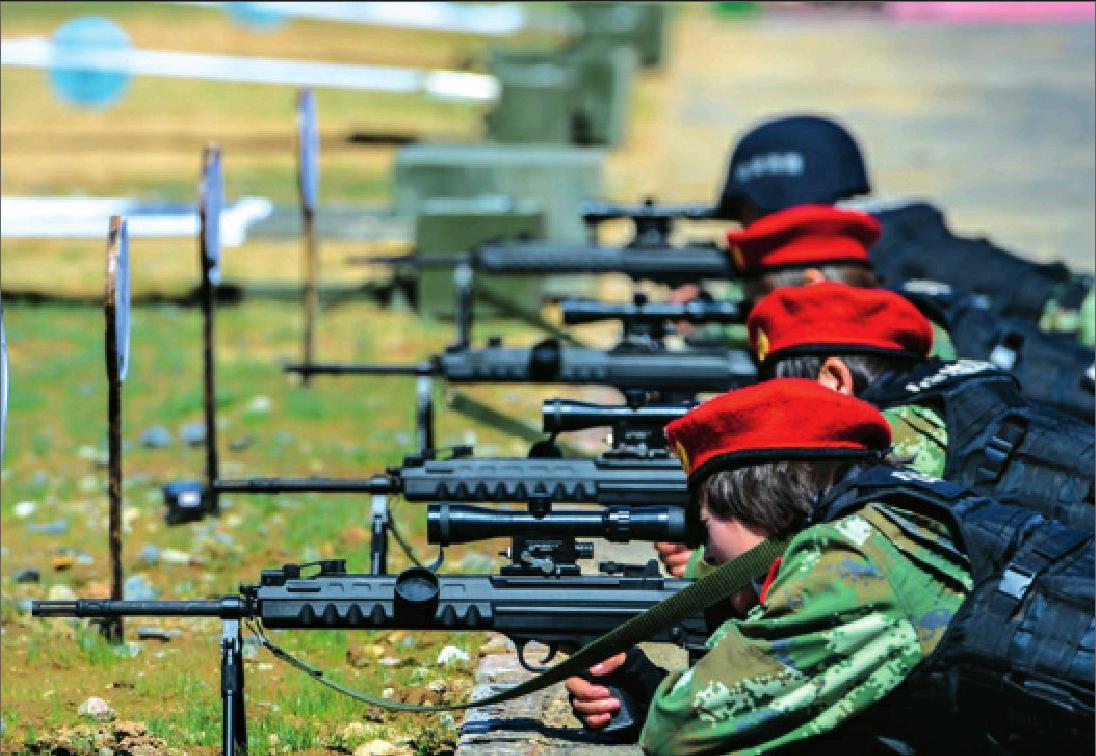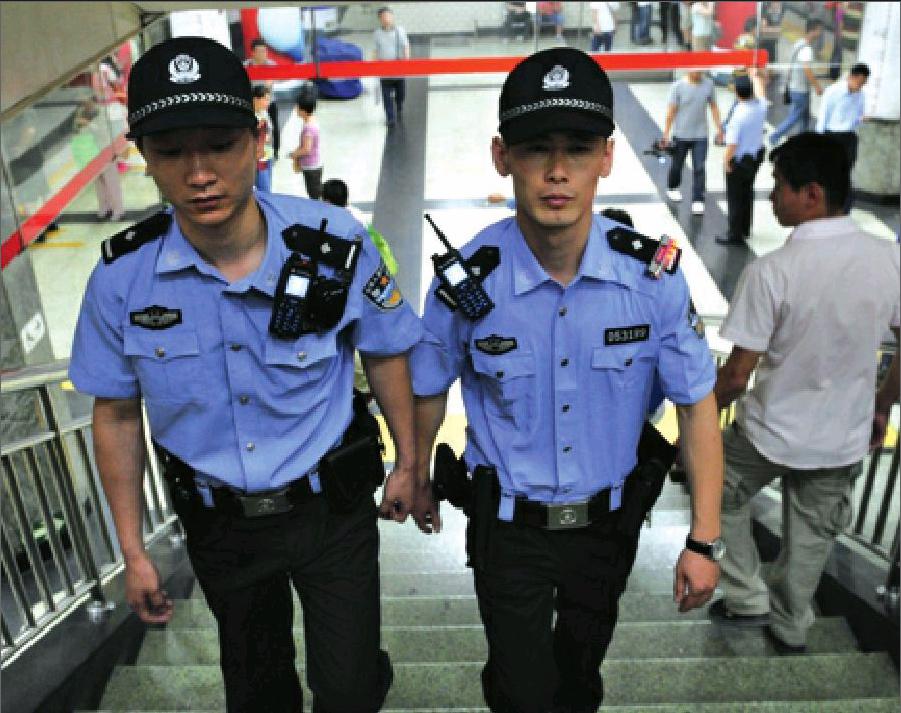COUNTER TERROR
2014-07-28ByYinPumin
By+Yin+Pumin


On May 26, Chinas top leadership re- iterated that the country will crack down on terrorist activities and ensure that the lasting social stability and security of Xinjiang Uygur Autonomous Region is maintained.
The stability of Xinjiang in northwest China is strategically vital to the countrys reform and development as well as its national security, according to a statement released after a meeting of the Political Bureau of the Communist Party of China (CPC) Central Committee.
Top priority should be given to the fight against violent terrorist attacks and religious extremist factions, the statement said, adding that confidence is needed to win the long-term struggle.
On May 22, 39 people were killed and 94 injured in a terrorist attack in Urumqi, Xinjiangs capital.
It was the second terrorist attack in Urumqi in less than a month. On April 30, a railway sta- tion explosion killed three people, including two attackers, and injured 79 others.
Earlier on March 1, knife-wielding terrorists from Xinjiang killed 29 innocent civilians and injured 143 at a train terminal in Kunming, capital city of southwest Chinas yunnan Province. Four of the perpetrators were shot dead by the police at the scene and four others were captured.
“violent terrorist attacks have become the most immediate and realistic peril to social stability in Xinjiang,” said Zhang Chunxian, Party chief of Xinjiang, in a bylined article in the newspaper Peoples Daily on May 26. He promised to “safeguard stability and resolutely prevent malignant violence and terrorist attacks” in the region.
Brutal slaughter
On the morning of May 22, 68-year-old Li Qiang, a retired gardener, went to the open air market at Park North Street near Renmin Park in Urumqi to buy vegetables. He never expected what he would witness when he prepared to make his way back home.
“Suddenly, two off-road vehicles roared past me and plowed into people without slowing down. Many people were knocked down, most of them were children or elderly,”Li recalled.
The worst happened next. The cars occupants threw explosives into the crowd. “How can anybody kill other people, especially old people and children, without any mercy?” Li asked with tears in his eyes.
The two vehicles then exploded, resulting in the deaths of four people inside.
In response to the fatal attack, President Xi Jinping pledged to severely punish terrorists and spare no efforts in maintaining stability.
Xi asked local authorities to solve the case quickly, offered condolences to the families of the victims and ordered the police to step up patrols and security control over possible terrorist targets and prevent ripple effects.
After an initial investigation, police had identified five suspects who took part in the attack, according to a statement by local authorities on May 23.
Four of the suspects—Memet Memtimin, Raghimjan Memet, Memtimin Mahmat and Ablet Abdukadir—died during the attack and were identified by their DNA. The fifth suspect, Nurahmat Ablipiz, was caught by the police on May 22 in Bayingolin Mongolia Autonomous Prefecture in Xinjiang.
The suspects had long been influenced by religious extremism, the statement said.
It was also revealed that the five men took part in illegal religious activities, as well as watched and listened to video and audio recordings that encouraged and sought to instigate violent attacks. At the end of 2013, they formed a terrorist gang. They made explosive devices, bought vehicles and chose the location of the attack before the killing on May 22.
After the attack, Xinjiang residents from different ethnic groups expressed their strong condemnation of terrorists, saying that they would not fear violence and would not allow the thugs to achieve their goal.
Tian Jufeng, a 79-year-old man of Han descent, was injured in the blast. He said he believes central and regional authorities will deal with the case effectively.
Tians wife, Wang Shuying, said that they have spent most of their life in Xinjiang and love the area. “We wont be scared away,” Wang added.
Alif Memet, a community official in Urumqi, said that he was saddened to hear that most of the victims in the attack were senior citizens. “I believe the incident has shocked every resident in Xinjiang. We need to enhance our awareness of terrorism and improve our self-defense capability,” Memet noted.
According to Rezya Habas, Deputy Director of the Road Building and Management Bureau of Urumqi, the attack tramples on the rule of law. He said that any people with a conscience would never tolerate such behavior and called the terrorists a common enemy to mankind.
“Terrorist attacks cannot scare us but will instead unite us even further,” said Ayiguli yimiti, a nurse with the First Aid Center of Urumqi.
Crackdown
On May 25, the Ministry of Public Security announced the start of a yearlong anti-terror operation throughout China.
The ministry asked the Xinjiang police and their counterparts across the rest of the country to cooperate and launch a strong, joint offensive against terrorism in order to stop terrorists from striking again and to prevent the forces of terrorism and religious extremism from spreading out of the region.
Under a preemptive strategy, police nationwide will pool their information for early identification of terrorist groups and their members, the ministry said, while emphasizing that the polices crackdown should only target terrorists and religious extremists and protect the legal rights and interests of ethnic minorities.
In line with arrangements of the Ministry of Public Security, police have stepped up armed patrols and security control at crowded public places across China and tightened the management of explosives and weapons.
“Once an emergency happens, nearby armed police can arrive at the area within only one minute,” said Zhang Bing, Deputy Director of Beijing Public Security Bureau, on May 22.
In Xinjiang, an all-out anti-terror campaign was launched even earlier on May 23. According to the local police, the campaign will last until June 2015. It will focus on terrorists and religious extremist groups, illegal gun and explosive manufacturing dens and terrorist training camps.
Soon after its launch, it has seen the apprehension of the first batch of terror suspects.
The regional authorities announced that the police busted an alleged terror and extremist group led by Abliz Dawut in south Xinjiangs Hotan Prefecture on May 26, seizing 1.8 tons of material for use in explosive devices and apprehending five suspects.
Abliz and his gang members are suspected of making detonation devices the night after the attack in Urumqi on May 22 and premeditating a similar terror attack in crowded locations in Hotan, said a police statement.
On the same day, similar raids were also carried out in Xinjiangs Aksu, Kashgar and Ili prefectures, leading to the arrest of a group of suspects allegedly involved in terrorist attacks, the dissemination of illegal pro-terrorist multimedia, the illegal production of explosives and illegal immigration.
According to figures released by the Xinjiang police force on May 25, 23 terrorist and religious extremist groups were taken down in the Hotan, Kashgar and Aksu prefectures earlier this month in a bust where more than 200 suspects were caught and more than 200 explosive devices were seized.
“The raids have been a deterrent to terrorists, and were also a concerted action to pressure others involved in terror activities to turn themselves in,” said Xu Jianying, a research fellow with the Research Center for Chinese Borderland History and Geography at the Chinese Academy of Social Sciences.
Xu made the comments in response to an official statement issued on May 24 that called on those involved in terrorist activities to surrender to the authorities.
The statement stated that those involved in terrorrelated activities would be given mitigated punishments if they turn themselves in within 30 days. It also encouraged the public to notify the authorities of any information that they are able to provide.
Xu believes tip-offs and voluntary surrenders will lead to an intelligence boost for the authorities. “We can expect that these raids will last at least one or two more months,” he said.
According to Xu, sometimes, local authorities only deal with terrorist attacks in a case-bycase manner. Xu commented that this method is incapable of rooting out the entire terrorist network.
The Xinjiang police force said that “uncompromising and innovative tactics” will be used in the ongoing anti-terror campaign. Some key figures related to terrorism and religious extremism will be put under control, and key villages and towns will be monitored and brought back under control, they added.
yang Shu, Director of the Institute for Central Asian Studies at Lanzhou University in northwest Chinas Gansu Province, said that the move is aimed at rooting out religious extremism, the deep-rooted cause of Xinjiangs terrorist activity. “Ring leaders may be able to identify those who have already participated in the spreading of religious extremism or those who are likely to be approached, such as unemployed youngsters,” yang said.
Li Wei, an anti-terrorism expert at the China Institutes of Contemporary International Relations, shared similar sentiments, adding that some villages where illegal preaching activities are prevalent will also be targeted.
“However, despite the emphasis of the uncompromising crackdown, the campaign will still be carried out within the framework of law,”Li said, regarding it as a strengthening of existing measures.
Long-term solution
Speaking at the second central work conference on Xinjiang, which was held in Beijing from May 28-29, President Xi stressed that the basic principle for easing religious tensions is to protect legal religious activities, deter illegal and extreme ones, guard against infiltration and crack down on crime.
Xi said that peoples normal religious demands should be protected in accordance with laws and regulations and their customs should be respected. “Legal channels for religious believers to obtain accurate and correct religious information should be broadened,” he added.
In 2013, the East Turkistan Islamic Movement, which is listed by the UN Security Council as a terrorist group, produced 107 proterror video and audio items, some of which were spread within China, according to Nuriman Rozi, a senior police officer with the Xinjiang Regional Public Security Department.
Many of the terror suspects seized in recent years were influenced by these and other similar pro-terror video and audio productions, Rozi commented.
A lack of education among the young could easily lead them to misinterpret Islamic teachings, leave them vulnerable to the influence of extremists, and make it difficult for them to find jobs that would provide them with a better life, said a report of Xinhua News Agency.
Along with tough anti-terror moves, central and regional authorities have adopted measures to improve the quality of life by securing jobs and education opportunities for people in Xinjiang.
Employment is the biggest issue concerning peoples livelihood, Premier Li Keqiang said at the Xinjiang work conference, urging all enterprises and investment projects in Xinjiang to try their best to employ local residents.
Efforts will be made to promote handicrafts with distinctive ethnic features and residents in the region will be encouraged to work in other parts of the nation, Li added.
The government also plans to help local people, especially the young, to learn to speak and write in standardized Mandarin Chinese, which will help bring more opportunities to them.
The meeting decided that special policies will be issued concerning the development of south Xinjiang, which has harsh geographical features that contribute to its lower living standards.
In accordance with a policy package unveiled at the meeting of the Political Bureau of the CPC Central Committee on May 26, the Party leadership vowed to ensure that at least one person from every “zero-employment”family in Xinjiang is offered a job and free senior high school education is available to children in south Xinjiang. Children in China are generally entitled to nine years of free education, covering primary and junior high schools.
“Improving peoples livelihood, with focus on employment and education, is a fundamental touch to address the threat of terrorism. Its of vital significance to give young people the confidence that they have a promising future,”said yu Deqing, a commentator with The Beijing News.
